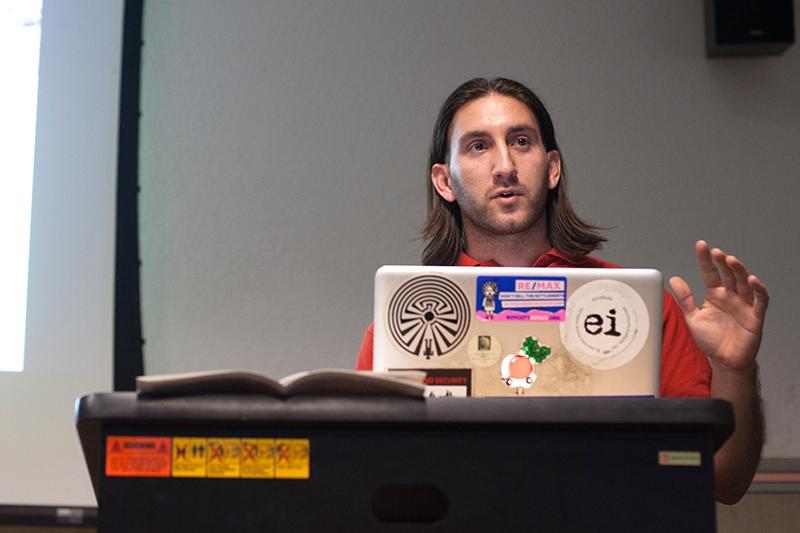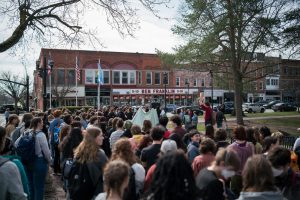Off the Cuff: Gabe Schivone, co-coordinator of UNIDOS youth group and volunteer at No Más Muertes/No More Deaths
Gabe Schivone, who is the co-coordinator of UNIDOS ethnic studies youth group and volunteer at No Más Muertes/No More Deaths
May 1, 2015
Gabe Schivone is a U.S.-Mexico border activist, volunteer at No Más Muertes/No More Deaths and co-coordinator of UNIDOS ethnic studies youth group in Tucson, AZ. He has written articles for The Huffington Post opposing the violence on the U.S.-Mexico border and in Palestinian territories. This week, Schivone visited Oberlin to give a talk titled Gaza in Arizona: Colonial Technologies and the Transnational Military Industrial Complex and to join Amanda Rose, OC ’13, in leading Environmental Justice From the Mexico-U.S. Border to Palestine/Israel, a workshop sponsored by Students for a Free Palestine. Tired of the Arizona sun, he sat in the shade of the Baldwin Cottage porch with the Review to discuss the advertising tactics of Israeli security technology firms, issues with President Barack Obama’s immigration reform and the term “tonks.”
In your talk you compare the U.S.-Mexico border to the Gaza Strip. How are they similar?
Well, I won’t be comparing so much as giving more material analysis about [them]. They both are funded by the United States government. There are a number of deeply integrated military technology systems and strategies, and so the material reality is so interconnected — for example, the proliferation of Israeli military security technology firms. So, actual companies you can trace have been entering the U.S.-Mexico border security market especially since the post-9/11 era. In fact, [by] Israel’s own figures in the Jerusalem Post, they’ve noted that their homeland security market has tripled in that same era, and this border security market is projected to grow in a worldwide scale to $500 billion by 2020. So it’s something that governments in the U.S. and Israel [and] high-tech corporate executives and leaders are very excited about.
Israel has something to offer. That is expertise. It’s the way that they market their products. They’re battle proven. The ones they have tested in the field, so to speak, [are] battle tested. Since the 1980s, Israeli participation in the U.S. genocide in Guatemala, for example, was reported on CBS and NBC as tried and tested in the occupied Palestinian territories. This isn’t something that’s a controversial language. This has been mainstream reported since the 1980s — that Israel is the expert of using occupied territories as laboratories and then modifying [their] uses to be then marketed and exported globally for their arms trade. One huge marketing site for them is the U.S.-Mexico border.
I steer away from comparing the two also because [of] the wall on the U.S.-Mexico border, if we’re going through international law — I don’t want to unfairly put international law on a pedestal — but even if you’re going by international law, the U.S.-Mexico border wall is built on the U.S. side. It’s built on an internationally-recognized border, but in the case of the occupation of Palestine, almost all of the wall — more than around 90 percent of the wall — is built on occupied territory, which is illegal. It’s not separating Gaza from Israel. It’s not separating specifically the West Bank. It’s not separating Israel from Palestinians. It’s separating Palestinians from other Palestinians, and it’s used as a weapon to protect the settlements as they’re expanded and built. But also on the U.S.-Mexico border there’s also colonial settlement that the wall is used for too. I think it’s just built on this 21st-century settlement.
What are your thoughts on Obama’s new immigration reform, which has been termed a compromise?
I think it depends on your point of view whether it’s a compromise. To someone like Obama, or to the Democrats on the political spectrum of right wing and far right wing — right wing being Obama and Democrats and far right wing being Republicans — they could see that as a compromise. One thing they agree is bipartisan is expanding militarization by 300 percent in some ways and giving $42 billion more to militarizing the border, which is going to mean more death, which is going to mean more incarceration of undocumented immigrants and is going to mean more criminal prosecutions of undocumented immigrants just for crossing a border line. I don’t see that as a compromise. I see that as hideous injustice that is just expanding human rights abuses that [taking place on] a massive scale now and then just tripling them.
What do you think could have been a better solution?
Withdrawing and repositioning border patrol. I mean, one of the [Comprehensive Immigration Reform] packages of that security package of the so-called compromise is to double border patrol from around 20,000 to now 40,000, and every president we’ve seen — before [President Bill] Clinton, but especially since Clinton — has been expanding the border patrol agent presence on the border. Clinton did it. Roughly, there were about a little less than 5,000 border patrol agents by the time Clinton came around. Under [President George W.] Bush it reached about 10,000. Obama [has] 20,000, and now he wants to expand it under the so-called compromise bill to 40,000. I think ending the militarization of the border is what needs to happen, and more equitable international economic treaties and economic policies is what is driving migration. Militarization is what is killing people left and right on the border, and so that’s what needs to end. Those are the root causes of this whole bloody, deadly situation.
In an article you wrote for The Huffington Post, you wrote that border and Homeland Security is a large and quickly growing industry. Do you feel the increased militarization of the Arizona-Mexico border is more due to pressure from this industry or cultural perceptions of the border and immigration?
I think both compound each other, and one gives intellectual and ideological justification for the other. So if these cultural perceptions of dehumanizing undocumented migrants [are] in the media and in discourse — how we talk about them — once they’re dehumanized we can do whatever we want to them. That ushers in this material reality of smashing their skulls in the desert. Border patrol has a culture of cruelty. They have a word for migrants. They call them “tonks,” and the reason why that word is so popular among border patrol is because that’s the sound that their metal [flashlights], popular among enforcement officers, … makes when they hit the migrants upside the heads. They’re smashing the skulls of migrants in the desert, incarcerating them, all sorts of horrific abuses in short-term custody. … [Migrants] are dying in the deserts in the thousands and turning the deserts into open graves and mass killing fields. This ideological justification as dehumanization allows that to happen without so much protest, so much criticism. It just allows it to happen. One makes possible and greases the wheels of the other.


























